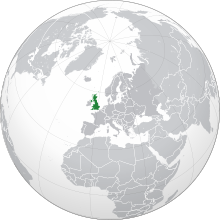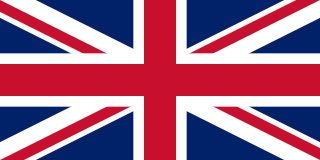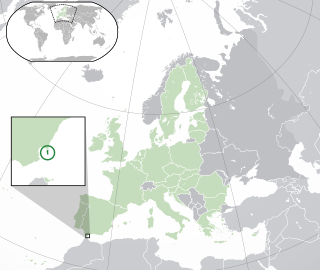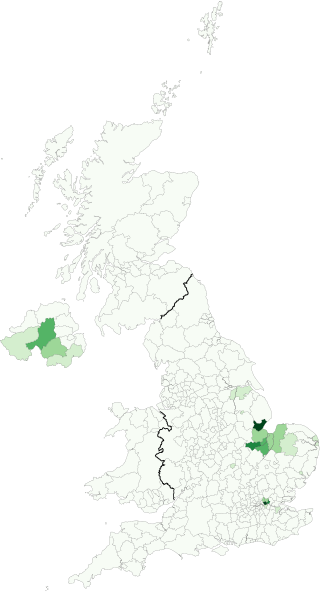
Part of a series on the |
|---|
| History of the United Kingdom |
 |
For the history of the Jews in the United Kingdom , including the time before the formation of the Kingdom of Great Britain in 1707, see:

| Part of a series on |
| Jews and Judaism |
|---|
| History of the United Kingdom |
|---|
 |
For the history of the Jews in the United Kingdom , including the time before the formation of the Kingdom of Great Britain in 1707, see:

The United Kingdom of Great Britain and Northern Ireland, commonly known as the United Kingdom (UK) or Britain, is an island country in Northwestern Europe, off the north-western coast of the continental mainland. It comprises England, Scotland, Wales, and Northern Ireland. It includes the island of Great Britain, the north-eastern part of the island of Ireland, and most of the smaller islands within the British Isles. Northern Ireland shares a land border with the Republic of Ireland; otherwise, the United Kingdom is surrounded by the Atlantic Ocean, the North Sea, the English Channel, the Celtic Sea and the Irish Sea. The total area of the United Kingdom is 93,628 square miles (242,495 km2), with an estimated 2023 population of over 68 million people.

Arthur Joseph Griffith was an Irish writer, newspaper editor and politician who founded the political party Sinn Féin. He led the Irish delegation at the negotiations that produced the 1921 Anglo-Irish Treaty, and served as the president of Dáil Éireann from January 1922 until his death later in August.

The history of the Jews in England goes back to the reign of William the Conqueror. Although it is likely that there had been some Jewish presence in the Roman period, there is no definitive evidence, and no reason to suppose that there was any community during Anglo-Saxon times. The first written record of Jewish settlement in England dates from 1070. The Jewish settlement continued until King Edward I's Edict of Expulsion in 1290.

Baron Lionel Nathan de Rothschild was a British Jewish banker, politician and philanthropist who was a member of the prominent Rothschild banking family of England. He became the first practising Jew to sit as a Member of Parliament in the House of Commons of the United Kingdom.

Religion in the United Kingdom, and in the countries that preceded it, has been dominated for over 1,400 years by various forms of Christianity, replacing Romano-British religions, Celtic and Anglo-Saxon paganism as the primary religion. Religious affiliations of United Kingdom citizens are recorded by regular surveys, the four major ones being the national decennial census, the Labour Force Survey, the British Social Attitudes survey and the European Social Survey.

The history of the Jews in Ireland extends more than a millenium. Although the Jewish community in Ireland has always been small in numbers in modern history, not exceeding 5,500 since at least 1891, Jews are generally a well-established and accepted part of Irish life. Jews in Ireland have historically enjoyed a relative tolerance compared to elsewhere in Europe.
British Jews are British citizens who identify as Jewish. The number of people who identified as Jews in the United Kingdom rose by just under 4% between 2001 and 2021.

The history of the Jews in Gibraltar dates back more than 650 years. There have been periods of persecution, but for the most part the Jews of Gibraltar have prospered and been one of the largest religious minorities in the city, where they have made contributions to the culture, defence, and Government of Gibraltar.
Ukrainians in the United Kingdom consist mainly of British citizens of Ukrainian descent.

The term Other White, or White Other, is a classification of ethnicity in the United Kingdom used in documents, such as the 2011 UK Census, to describe people who self-identify as white persons who are not of the English, Welsh, Scottish, Romani or Irish ethnic groupings.

Great Britain is an island in the North Atlantic Ocean off the north-west coast of continental Europe, consisting of England, Scotland and Wales. With an area of 209,331 km2 (80,823 sq mi), it is the largest of the British Isles, the largest European island and the ninth-largest island in the world. It is dominated by a maritime climate with narrow temperature differences between seasons. The island of Ireland, with an area 40 per cent that of Great Britain, is to the west—these islands, along with over 1,000 smaller surrounding islands and named substantial rocks, form the British Isles archipelago.

The following outline is provided as an overview of and topical guide to the United Kingdom of Great Britain and Northern Ireland; a sovereign country in Europe, commonly known as the United Kingdom (UK), or Britain. Lying off the north-western coast of the European mainland, it includes the island of Great Britain—a term also applied loosely to refer to the whole country—the north-eastern part of the island of Ireland and many smaller islands.

Since 1922 the United Kingdom has been made up of four countries: England, Scotland, Wales and Northern Ireland. The UK Prime Minister's website has used the phrase "countries within a country" to describe the United Kingdom. Some statistical summaries, such as those for the twelve NUTS 1 regions of the UK, refer to Northern Ireland, Scotland, and Wales as "regions". With regard to Northern Ireland, Scotland and Wales particularly, the descriptive name one uses "can be controversial, with the choice often revealing one's political preferences".

The following outline is provided as an overview of and topical guide to England:

Lithuanians in the United Kingdom include individuals born in Lithuania who have migrated to the UK, among them Lithuanian citizens of Russian descent, as well as their British-born descendants. The 2011 UK Census recorded 95,730 Lithuanian-born residents in England, 1,353 in Wales, 4,287 in Scotland, and 7,341 in Northern Ireland. The previous, 2001 UK Census, had recorded 4,363 Lithuanian-born residents. The Office for National Statistics estimates that 144,000 Lithuanian-born immigrants were resident in the UK in 2013.

Relations between the European Union (EU) and the United Kingdom of Great Britain and Northern Ireland (UK) are governed, since 1 January 2021, by the EU–UK Trade and Cooperation Agreement (TCA).